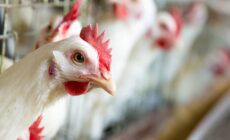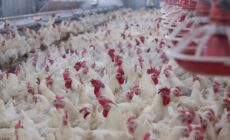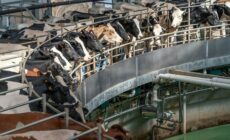Animal Agriculture
The meat, eggs and dairy at the center of many plates are also at the center of some of our world’s greatest threats to the environment, public health, workers’ rights and animal welfare. Animal products are the most resource-intensive foods in our diet — they require massive water and energy inputs and generate significant greenhouse gas emissions, soil, air and water pollution.
In order to avert the worst impacts of climate change and protect water supplies for future generations, we must produce and eat “less and better.” This means consuming fewer animal products, supporting the farmers and ranchers who are raising animals sustainably and making sure that everyone has access to the healthiest options.
Most animals are raised in factory farms where they are fed a diet of genetically engineered corn and soy, grown with toxic pesticides and synthetic fertilizers which pollute our rivers and groundwater. Raising billions of animals in confined areas also generates massive amounts of toxic manure that pollute our air and water — especially in nearby communities. Overuse of antibiotics in animal agriculture contributes to the rise of antibiotic resistant “superbugs,” one of our most pressing public health problems. Jobs on factory farms and slaughterhouses are associated with some of the highest rates of worker injury and illness.
To solve these problems, we must dramatically reduce meat consumption, reform current animal agriculture practices and shift to more sustainable livestock production. More sustainably-raised options, like pastured organic meat and dairy, are better for people and the planet.
We hope that this scathing report is the beginning of the end of public financing of industrial animal agriculture projects that pollute, fuel the climate crisis, and trample on community rights.
EPA’s decision to walk away from updating slaughterhouse pollution standards is a direct contradiction to Make America Healthy Again.
Washington has the chance to do what California didn’t: stand up to polluting agribusiness and stop subsidizing them to continue harmful practices.

Across the Eastern Shore, large-scale industrial poultry operations collectively raise nearly 300 million chickens a year. Their manure — more than 500 million pounds annually — doesn’t just vanish.

What are CAFOs? They are an example of industrial agriculture, which aims to produce as many calories as possible as cheaply as possible.

The production and use of manure biogas hurts communities in numerous ways. Hear from community members about how it’s affecting them:
